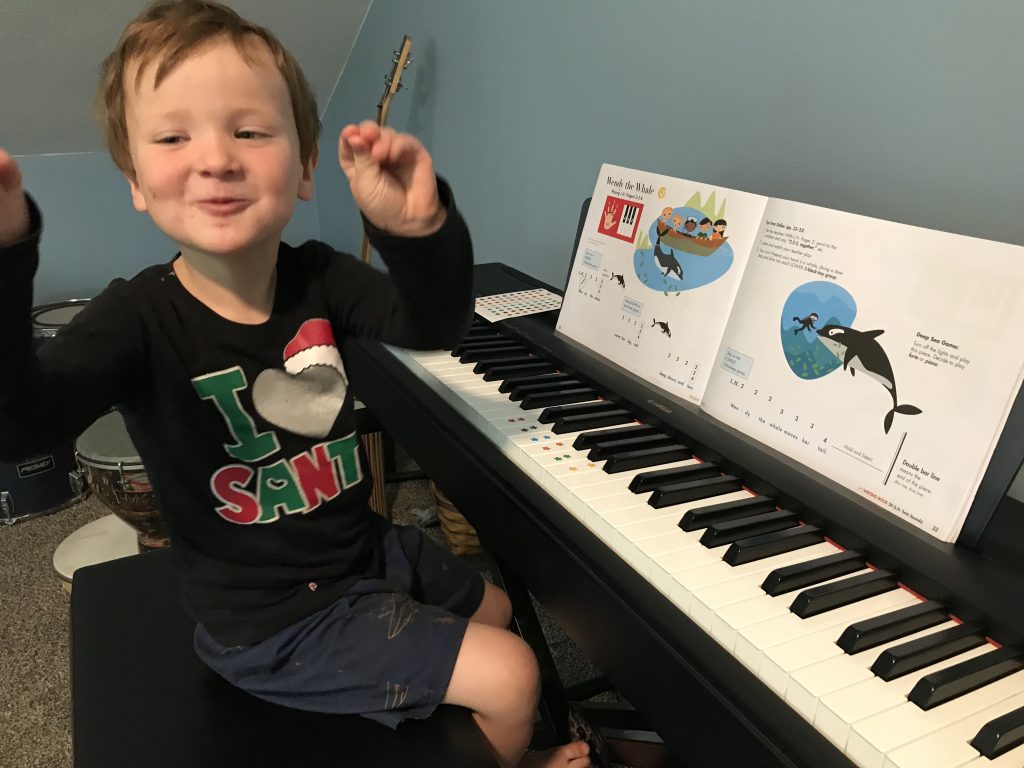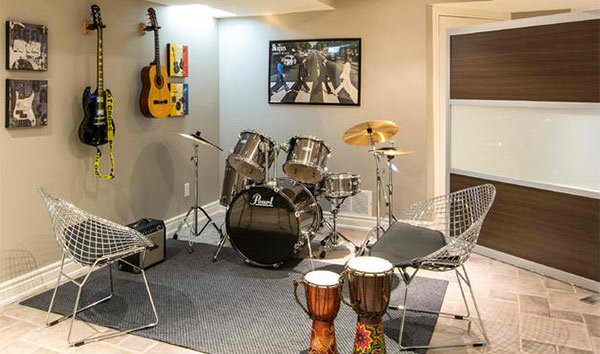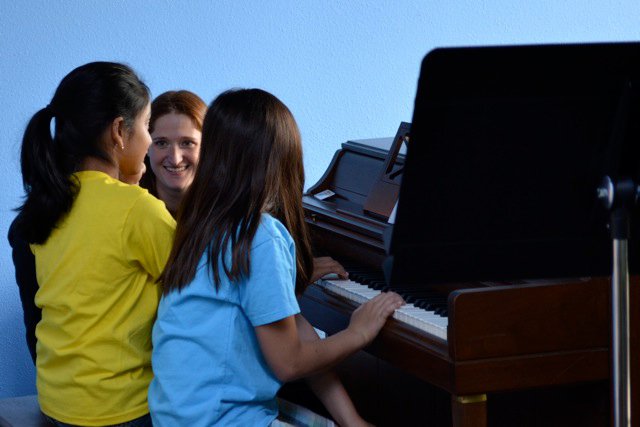This is the single most frequently asked question that parents ask me. And the most important thing to master in your household if you want your child to learn, love, and succeed with music long term. This is my best advice after two decades of helping thousands of music students and now homeschooling my own two (very active and not usually motivated to practice… 😉 children.
Have a Dedicated Space
If you’re struggling with getting your kiddo to sit down and play music, having a set place in the house where the music making can happen is the first place to start. I’ve tried a lot of various scenarios in my own home and the best thing to do is to just pick a spot and see how it works. Sometimes turning a bonus room into the music room is great, because the whole family can go in there together and jam. For my family, I’ve found that having practice happen near the kitchen is best because it’s the place where I spend the majority of my time and I can jump over and help with practice much more easily when it’s time. I’ve found that the biggest consideration is a place where you can keep everything out and ready to go. If half of the practice time has to be spent on setting up the wire music stand that is kept in the closet and pulling in a chair from the other room, it’s going to feel like a bigger hassle than it needs to be.
Set a Time
Kids thrive on routine and predictability. Lots of studies have shown that it makes them more confident and can even contribute to things like having a better immune system. Don’t spring it on them… choose days and times for practice and stick to it. This can sometimes take a lot of time to establish (and if you’re anything like me, it might take A LOT of your own will power to follow through with it 😉 but the rewards you will reap later will be totally worth it. There will be way less conflict about it because your child has internalized the routine. If your child is really struggling with motivation, you might consider doing practice right before something they really want to do (like screen time or time with friends). So there is something to look forward to afterward.
Sit Down with Them
One of the 5 love languages of children is Quality Time. In fact, taking the 10-15 minutes of time to sit down next to your child can also check off the boxes on these other love languages too: Acts of Service, Physical Touch, and Words of Affirmation. Wow. Who knew that aside from all the other benefits of learning music, you have a huge opportunity each practice session to fill your child’s love tank too!
You may ask “But I’m not a musician myself, how can I even begin to help them?” Remember that the main goal of sitting down with them is to mimic the routine of going to a lesson by helping them sit down and play at home too. Sitting in on their lessons will help you understand *what* they are learning so you can help them more during that at-home time. But for now, if playing music at home isn’t happening at all, don’t worry about what they are playing yet… if they are playing anything at all during that time, that’s awesome, awesome, awesome. When you feel like you’ve got a good handle on this step and are ready for more guidance and support, email me at rdolphin@oregonmusicacademy.com
The main thing to remember: Don’t expect them to want to go practice alone. It’s not a reflection of their lack of effort or their not wanting to do music anymore, etc etc etc… but more a reflection of their needing connection with you. Give them that connection and watch the magic start to happen.
Use Rewards
There is one love language that we haven’t covered yet… Gifts. When your child sets a practice goal and achieves it, reward it with a gift. Maybe you have a chart at home and each time your child sits down to play, they get a sticker for that day. Then when they get 20 or 30 stickers, they get a trip to their favorite ice cream place. Or that lego set they’ve been asking for. Intrinsic motivation is always best, but they are gaining a lot of intrinsic motivation simply by continuing with music and seeing the results of their hard work over a long period of time. Some short term external motivators along the way don’t hurt! Use them.
Play Music with Others
Your child needs the individual attention of their lesson to make sure they gain all the skills they need and don’t develop any bad habits. But playing only for their teacher can sometimes get a little stale and practice can start to wane. Music is meant to be shared and having a group that your child can play in regularly will help them stay more motivated. Why? Because…
There is a healthy accountability that happens when the group is counting on them to practice their part.
There are built-in learning moments when they see their peers practiced and they didn’t.
They get to play cool music together that they can’t do by themselves.
They get to write music together.
Record their music together.
Play shows together.
To pull all of that off, they will have to practice. They won’t want to let their group down…
If you are already rocking it with this list and need more ideas of how to motivate your child, I have a ton of other tips and tricks. Just ask! Email me at rdolphin@oregonmusicacademy.com



